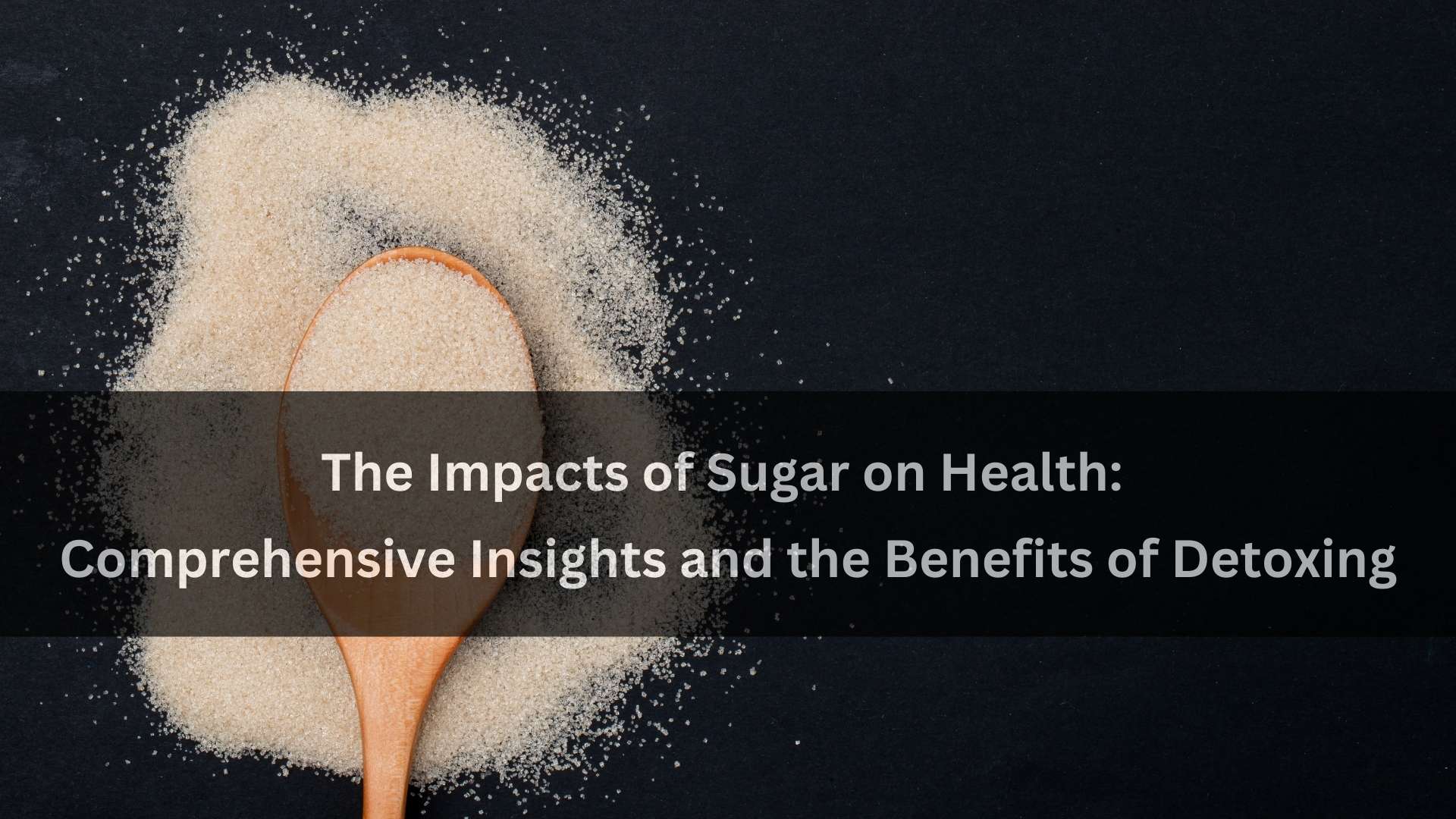Sugar is a prevalent component in modern diets, often hidden in processed foods and beverages. Excessive sugar consumption, especially of refined sugars, has been linked to numerous health problems. In this blog, we explore the impacts of sugar on health, including controversial effects, and discuss the benefits of detoxing from sugar.
Understanding Sugar and Its Common Sources
Sugar is found naturally in many foods, including fruits, vegetables, and dairy products. However, the problem lies in added sugars, which are incorporated into foods and drinks during processing. These added sugars are present in items such as soft drinks, candies, baked goods, and even seemingly healthy products like yogurt and granola bars.
9 Impacts of Sugar on Health
1. Obesity and Weight Gain
One of the most well-documented impacts of sugar consumption is its contribution to obesity and weight gain. Sugary foods and drinks are high in calories but low in nutritional value. Excess sugar intake can lead to an imbalance between calorie consumption and expenditure, resulting in weight gain. Furthermore, sugar-sweetened beverages do not promote satiety in the same way solid foods do, leading to increased overall calorie intake.
2. Type 2 Diabetes
Excessive sugar consumption is a significant risk factor for developing type 2 diabetes. High sugar intake leads to increased insulin resistance, a condition where the body’s cells become less responsive to insulin. This can eventually result in higher blood sugar levels and the development of diabetes. Reducing sugar intake is a critical step in managing and preventing type 2 diabetes.
3. Heart Disease
Consuming high amounts of sugar can increase the risk of heart disease. Diets high in sugar are linked to several heart disease risk factors, including obesity, inflammation, high triglyceride levels, high blood pressure, and high blood sugar levels. These factors collectively increase the risk of cardiovascular diseases such as heart attacks and strokes.
4. Dental Health
Sugar is a well-known culprit in the development of dental cavities. Bacteria in the mouth feed on sugar, producing acid that erodes tooth enamel, leading to cavities and tooth decay. Reducing sugar intake can significantly improve dental health and reduce the need for dental interventions.

5. Mental Health
There is a growing body of research suggesting that high sugar intake may negatively impact mental health, contributing to conditions such as depression and anxiety. Some studies indicate that excessive sugar consumption can lead to inflammation and changes in brain function, which may affect mood and cognitive function. However, the relationship between sugar and mental health is complex and influenced by various factors, making this a contentious area of study.
6. Addictive Properties
Some experts argue that sugar has addictive properties similar to those of drugs. Sugar consumption triggers the release of dopamine, a neurotransmitter associated with pleasure and reward, which can lead to cravings and a cycle of addiction-like behavior. Critics, however, contend that while sugar can lead to habitual consumption, it does not meet the criteria for addiction in the same way substances like nicotine or opioids do.
7. Cancer Risk
The link between sugar consumption and cancer risk is a controversial topic. Some research suggests that high sugar intake can contribute to cancer development by promoting insulin resistance and inflammation, which are linked to cancer growth. However, other studies do not find a direct connection between sugar and cancer, indicating that more research is needed to clarify this relationship.
8. Skin Health
High sugar intake is often blamed for skin problems such as acne and premature aging. The theory is that sugar increases insulin levels, leading to inflammation and the production of sebum, which can cause acne. Additionally, sugar can cause glycation, a process where sugar molecules attach to proteins in the skin, leading to wrinkles and loss of elasticity. However, the evidence is mixed, and other factors like genetics, overall diet, and skincare habits also play significant roles in skin health.
9. Cognitive Function
Some studies suggest that high sugar consumption can impair cognitive function and increase the risk of neurodegenerative diseases like Alzheimer’s. The proposed mechanism is that sugar can cause inflammation and insulin resistance in the brain, affecting memory and learning. However, this is still a developing area of research, and the direct impact of sugar on brain health remains controversial.
Benefits of Sugar Detoxing

Given the numerous potential impacts of sugar on health, detoxing from sugar can offer a range of benefits. Here’s a closer look at how reducing sugar intake can improve overall well-being:
1. Enhanced Energy Levels
Eliminating sugar from your diet can lead to more stable and sustained energy levels. Sugar causes rapid spikes and crashes in blood glucose levels, leading to fluctuating energy levels and feelings of fatigue. A sugar detox helps stabilize blood sugar, resulting in consistent energy throughout the day.
2. Improved Mental Clarity and Mood
High sugar intake is linked to mood swings and cognitive impairments. Detoxing from sugar helps stabilize blood sugar levels, which can enhance mental clarity, improve focus, and balance mood. Many people report feeling less foggy and more mentally sharp after reducing their sugar intake.
3. Weight Loss and Reduced Belly Fat
Sugar is a significant contributor to weight gain, particularly around the abdomen. Detoxing from sugar can lead to significant weight loss, especially in the belly area. This is crucial because visceral fat, which accumulates around vital organs, is associated with various metabolic diseases.
4. Better Gut Health
The gut microbiome, which plays a vital role in overall health, is adversely affected by excessive sugar consumption. Sugar feeds harmful bacteria and yeast in the gut, leading to dysbiosis. A sugar detox promotes a healthier balance of gut bacteria, improving digestion and reducing gastrointestinal issues.
5. Enhanced Immune Function
High sugar intake can suppress the immune system, making the body more susceptible to infections. Detoxing from sugar helps strengthen the immune response, enhancing the body’s ability to fight off illnesses.
6. Reduced Risk of Chronic Diseases
Chronic diseases such as type 2 diabetes, heart disease, and certain cancers are closely linked to high sugar consumption. By reducing sugar intake, you lower your risk of developing these conditions, leading to a longer, healthier life.
Implementing a Sugar Detox
Detoxing from sugar involves more than just cutting out obvious sources of sugar. Here are some practical steps to help you get started:
- Read Labels: Be vigilant about reading food labels to identify hidden sugars in processed foods.
- Focus on Whole Foods: Consume whole, unprocessed foods like vegetables, fruits, lean proteins, and healthy fats.
- Stay Hydrated: Drink plenty of water to help flush out toxins and reduce sugar cravings.
- Seek Support: Engage with a healthcare provider, nutritionist, or support group to stay motivated and address challenges during the detox.

Challenges of Sugar Detoxing
Detoxing from sugar is not without its challenges. Withdrawal symptoms such as headaches, fatigue, irritability, and cravings can make the initial phase difficult. However, these symptoms typically subside after a few days to a week as the body adjusts to lower sugar levels.
Conclusion
Sugar has a profound impact on health, contributing to various chronic conditions and potentially affecting mental health and cognitive function. While some impacts of sugar consumption are well-documented, others remain controversial and subject to ongoing research. Detoxing from sugar offers numerous benefits, including improved energy levels, mental clarity, weight management, gut health, immune function, and reduced risk of chronic diseases. By taking a proactive approach to reducing sugar intake, individuals can make significant strides towards better health and well-being. As with any dietary change, it’s essential to approach sugar detoxing with a balanced perspective and seek professional guidance to ensure it aligns with your individual health needs and goals.

